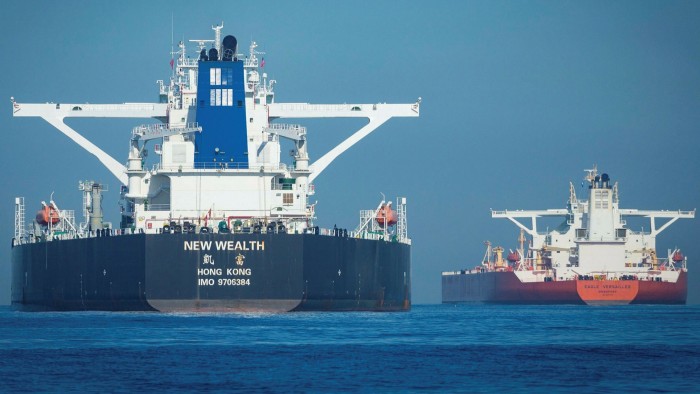Fidelity warns of supply chain risks due to stranded seafarers

Roula Khalaf, Editor of the FT, selects her favourite stories in this weekly newsletter.
Fidelity International, the $566bn asset manager, has called on companies and governments to urgently address an unfolding crisis in global supply chains as hundreds of thousands of ship workers remain stranded at sea because of the pandemic.
The investment house is contacting 30 companies, including shipowners, airlines and groups that charter ships, to raise concerns about the conditions facing seafarers.
Many countries have prohibited seafarers from disembarking during the pandemic, which Fidelity said was putting the health and safety of workers at risk and piling pressure on global supply chains.
Jenn-Hui Tan, global head of stewardship and sustainable investing at Fidelity, said an estimated 90 per cent of world trade relies on shipping, providing a vital service for businesses and consumers. He said seafarers should be classified as essential workers and allowed to disembark.
“Seafarers provide an essential service. Our food, our energy, so much of our trade we wouldn’t have without seafarers,” he said.
Workers on merchant ships often work long hours, seven days a week. According to the International Transport Workers’ Federation (ITF), there are about 300,000 seafarers trapped aboard vessels, while a similar number are facing financial ruin as many have not been able to return to work.
Stephen Cotton, ITF general secretary, said in July it was not sustainable to have so many fatigued seafarers.
“Seafarers and their unions are deeply concerned about the risk to life, property and the environment as the chances of a major catastrophe or catastrophes rises daily. Governments must act before we see more people die, or worse — a major maritime disaster,” he said.
Some seafarers have refused to work after their contacts expired in order to be repatriated. Under current regulations, the maximum continuous period a seafarer should serve on board a vessel without leave is 11 months. Fidelity estimates that of the 1.2m seafarers on merchant ships roughly half come from China, Russia and India.
For many seafarers, “their economic situations are poor and they don’t have that leverage to be able to call attention to their plight,” said Mr Tan.
Bill Dobie, chief executive of Sedna Systems, which produces software of the shipping industry, warned there could be a “massive commercial impact” if ship workers cannot be repatriated in a timely and safe manner.
Inside ETFs

The FT has teamed up with ETF specialist TrackInsight to bring you independent and reliable data alongside our essential news and analysis of everything from market trends and new issues, to risk management and advice on constructing your portfolio. Find out more here
“There are literally thousands of people who haven’t been home for months. Governments are indifferent to their case and yet seafarers are vital to their economies,” Mr Dobie said.
Mr Tan said the solution required a “multilateral approach” by governments, shipowners, charter companies and airlines.
He said there was a big logistical challenge to repatriate seafarers because of the reduction in international flights in response to the pandemic. There was also an economic cost, as ships altered routes in order to allow workers to leave.
“We need to permit crew changes, for the health and safety of workers and for the safety of the cargo. That needs to happen, but in a way that doesn’t affect the health of other people,” he said.
Comments